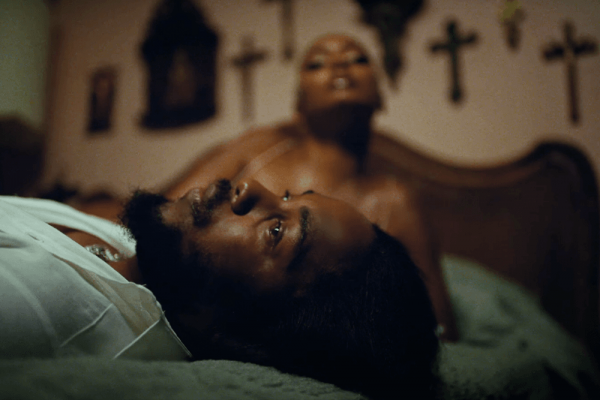All the glory Kendrick Lamar has received for his three Grammy Album of the Year nominated works of Christ-influenced, socially conscious rap (good kid, m.A.A.d city; To Pimp a Butterfly; DAMN.) masks a difficult truth: To be a fan of his music, you have to disregard its desecration of women. How often it refers to them as the b-word. How often it portrays them as simply objects designed for male sexual pleasure.
I justified this aspect of Lamar’s art by telling myself he was merely holding a mirror to our society’s flaws. Lamar’s albums are known for visceral storytelling resembling novels and linked short story collections. One of the most dazzling things about Lamar is how he can change his voice from song to song, tale to tale, like Anna Deavere Smith in her one-woman-many-characters plays. When I reviewed Lamar’s album DAMN. in 2017, I called him “an American storyteller on the same plane as Toni Morrison.”
But his latest release — a double album — Mr. Morale & the Big Steppers contains little of that artistry. Its beats are not surprising. In lieu of innovation, I would have settled for them being bangers, but the tracks feel less like bops, more like vibes. They match the pared down nature of Lamar’s words, which aren’t a cohesive narrative but rather a therapy session, as Lamar darts from subject to subject with the ultimate focus of shedding his secrets. Throughout Mr. Morale & the Big Steppers, the greatest rapper I’ve ever heard repeats variations of what he states plainly in the album’s song “Savior:” “The cat is out the bag, I am not your savior. I find it difficult to love thy neighbors.”
Lamar knows he’s problematic and this new project is his way of letting his devotees know, as though it hasn’t been clear to us. Apart from the misogyny throughout his oeuvre, how could we forget “Mortal Man,” the final song of To Pimp a Butterfly in which Lamar suddenly reveals his disbelief of the sexual assault accusations posthumously brought against Michael Jackson. “[He] gave us Billie Jean, you say he touched those kids? / When the shit hits the fan, is you still a fan?” Kendrick seemed to be wondering: When I’m eventually cast in a negative light, will listeners still be around?
This appears to still be on his mind. That explains why he included the rapper Kodak Black — who was charged with sexually assaulting a high school student, pleaded guilty to a lesser charge, and apologized to the victim — on several Mr. Morale & the Big Steppers songs. “What the f*** is cancel culture, dawg?” Lamar asks on “N95,” his album’s first single. He goes on to say, “Oh, you worried ‘bout a critic? That ain’t protocol.” In the song “Worldwide Steppers” he complains about the murder of freedom of speech. And in “Savior” he speaks of rappers who “bite they tongues in rap lyrics / Scared to be crucified about a song but they won’t admit it. / Politically correct is how you keep an opinion.”
The intent of spotlighting his problematic nature explains why Lamar reveals in the album that he cheated on his fiancée and why, in the song “Auntie Diaries” in which he raps about accepting his transgender uncle and cousin, he misgenders both and says the anti-gay f-word repeatedly. Both the cheating and misgendering are linked, in my view — homophobia and transphobia are derivatives of misogyny.
Mr. Morale & the Big Steppers is brilliant in how it forces fans to reckon with Lamar’s brokenness, which is also to say our brokenness, and the complexity of ungodliness in general. Does the impossibility of human perfection on this earth mean we should ultimately overlook the harm we cause each other, cherish the good and forget the bad?
For I remember when, in college, I heard To Pimp a Butterfly for the first time and wept. I listened to it 25 more times, tearing up whenever I merely mentioned my appreciation of it to anyone. Because I identified with Lamar’s song “u” about his depression, and the music and verses of “You Ain’t Gotta Lie” reminded me of my great-grandma, and “Alright” reminded me that my Black life mattered, and “i” and its refrain “I love myself” reminded me that despite my body’s contrast with Hollywood and Eurocentric standards and my queerness, I was worthy of life. To Pimp a Butterfly didn’t just make me feel seen, it made me feel cherished.
But perhaps a Black woman listened to the album’s song “These Walls” and felt minimized by the song’s female muse being a pawn, a trophy for two men in the song’s narrative to fight over, one of the men having sex with the woman for the purpose of angering the other man.
Lamar’s fans have a decision to make: Will we continue to listen to his works and others like it? Will we accept what’s holy about Lamar’s work and ignore what’s sinful, knowing that this could have a ripple effect on other aspects of our lives and on our interactions with the human beings whom Lamar’s music denigrates? What is the line? What are our standards? What is our harm?
“Maybe it’s time to break it off,” Kendrick suggests in “Mirror,” the final song of Mr. Morale & the Big Steppers. “Run away from the culture to follow my heart.”
It’s not the first time we’ve been called away from the ways of this world to something greater.
Got something to say about what you're reading? We value your feedback!







